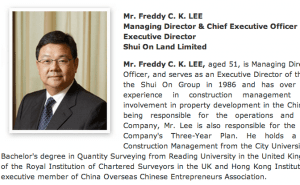Shui On Land CEO Freddy Lee abruptly stepped down from his leadership of one of China’s best-known real estate developers late last week, leading to speculation that he had been dismissed by company founder and chairman Vincent Lo.
In a statement to the Hong Kong Stock Exchange on Friday, the company, which is best known for its Xintiandi project in central Shanghai, announced that Lee had relinquished his membership in the board of directors, as well as his executive responsibilities with the company to “devote more time to personal endeavors.”
During the last year shares in the Shanghai-based developer have fallen from a high of HK$3.81 per share to as low as $2.10 per share, as investors have worried over the company’s excessive debt and a trend towards consolidation as the industry enters a period of slower growth. Even after selling off equity and assets during the last several months, Shui On’s stock price stood at $2.39 per share on Thursday, and after the leadership change, closed the day on Monday at $2.34 per share.
Lee originally joined Shui On in 1986, and was hand-picked by company founder and chairman Vincent Lo to take on the CEO position when Lee stepped down less than two years ago. Now Lo will once again assume CEO responsibilities until the company selects a successor, according to the announcement.
Shui On Fights Debt and Slowing Sales
While the company’s successful conversion of a century old shikumen development in downtown Shanghai into the upscale Xintiandi residential, retail and office district has helped it to build a brand, Shui On’s subsequent attempts to spread that brand into China’s hinterlands have built a mountain of debt. Unfortunately for Freddy Lee and his former company, these debts look more like liabilities as China’s government clamps down on credit and Shui On’s sales struggle.
According to a recent report in Bloomberg,
Shui On sold 16.6 billion yuan of properties last year, almost triple the amount from a year earlier, it said in a statement on Jan. 7. Only 9.9 billion yuan came from selling homes, while the rest came from en-bloc sales of buildings, according to Johnson Hu, a Hong Kong-based property analyst at CIMB-GK Securities Research.
Fire Sales Not Enough
During the last several months, Shui On has taken a number of measures, including an attempted IPO of a subsidiary, equity sales and asset sales to improve its balance sheet, however, none of this has had much impact on its stock price.
During May the company announced plans for an IPO of its recently created Xintiandi subsidiary, but when interest proved insufficient, in October sold a 21.7 percent stake in that company to Brookfield Property Partners for US$500 million.
Then in early December Shui On sold its Chongqing Tiandi property for RMB 2.4 billion (US$393 million) and an uncompleted Shanghai office tower for RMB 3.32 billion ($545 million) in separate transactions.
Market Pessimistic on Emerging Cities Projects
Despite Shui On’s moves to improve its balance sheet, the market remained skeptical of the firm’s mix of debt and underperforming projects in China’s emerging cities.
Following the success of Xintiandi in Shanghai, Shui On attempted to leverage the brand by developing a series of “Tiandi” projects across China, as well as buildings in the outlying areas of the major cities.
While the company successfully sold off its recently opened Chongqing Tiandi project this year, it continues to hold Xihu Tiandi in Hangzhou, Wuhan Tiandi in Wuhan, Dalian Tiandi, and Foshan Lingnan Tiandi in Guangdong. While China’s overall housing market experienced strong growth during 2013, there was a notable split between first-tier cities and the rest of the country, as many emerging cities suffered from oversupply.

Leave a Reply